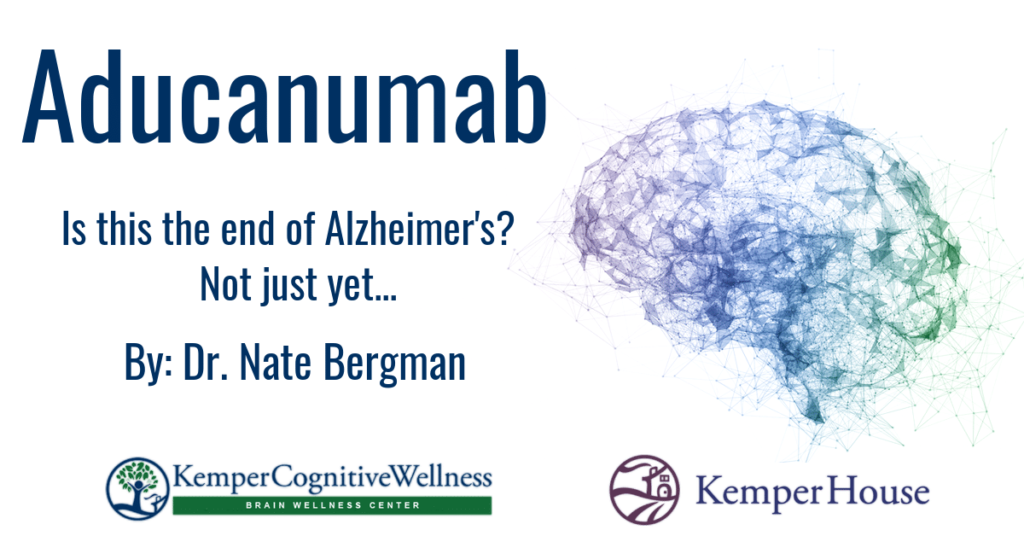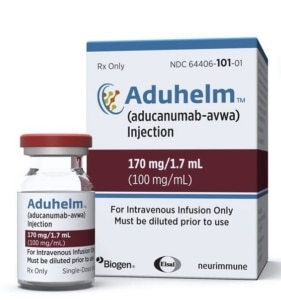
Aducanumab
Aducanumab – Is this the end of Alzheimer’s? Not just yet…
It’s been 18 years since the last drug was approved for Alzheimer’s, but on Monday, June 7, 2021, the FDA gave “Accelerated Approval” to Biogen’s novel medication, Aducanumab (“Aduhelm”). The FDA’s Accelerated Approval pathway is given to drugs that show promise, but approval is provisional contingent upon verification of clinical benefit in future clinical trials. Essentially, the FDA approves some drugs for life-threatening diseases that have no other approved medication even though more data is needed on the drug’s effectiveness. The FDA can revoke the approval in the future if it sees fit.
What can participants expect from BrainFit?

It’s not entirely clear.
The two big trials of Aducanumab, EMERGE and ENGAGE showed mixed results with EMERGE trials showing small improvements in individuals receiving the highest doses (10mg/kg of body weight). EMERGE was able to show a 3% improvement over the drug maker’s predefined goal of 20% to assess if the whole experiment was futile or not. The ENGAGE trial did not show significant improvements and did not perform better than the placebo.
Therefore, it is not clear that Aducanumab will improve Alzheimer’s symptoms (eg memory, language, ability to stay cognitively intact enough to maintain some aspects of independent living).
What is clear is that Aducanumab – like several similar immunotherapy drugs – does appear to remove the toxic amyloid-beta protein bundles found in Alzheimer’s disease. Previous studies with other similar drugs, however, either had no impact on Alzheimer’s symptoms and did not prevent people from getting worse or, in some studies, the drugs themselves actually made Alzheimer’s symptoms worse.
How Does Aducanumab Work?
Aducanumab is a monoclonal antibody and is in a class of drugs known as “immunotherapies.” Immunotherapies are used for many different kinds of diseases such as cancer and autoimmune disease. Toxic protein clumps of amyloid-beta proteins have long been known to be one of many pathologic features of Alzheimer’s disease. Aducanumab was created by chemists to mimic aspects of the human immune system and is able to find, stick to, and dissolve amyloid-beta clumps in the brain effectively reducing the total number of clumps in the brain. Scientists hope this reduction of toxic amyloid clumps will improve those with Alzheimer’s, but again, the Aducanumab trials didn’t clearly show that.
Aducanumab is given by intravenous (IV) infusion once a month. It is not available as a pill at this time. The infusion will be done at an infusion center or hospital setting. Each infusion takes about one hour to administer.
Dosing is based on a person’s weight. The dose is slowly escalated to the highest doses over the course of several months reaching the 10mg/kg mark by about month 6. The 10mg/kg was the only dose where Biogen was able to conclude that individuals taking it might be improving.
How Does Aducanumab compare to existing drugs approved for Alzheimer’s?
Prior to Aducanumab’s accelerated approval by the FDA, only two other drugs had achieved FDA approval status, Aricept and Namenda. These two drugs have no impact on the underlying drivers of Alzheimer’s disease. The critical distinction here is that Aducanumab is the first drug to target one of the underlying drivers of Alzheimer’s disease, the build-up of toxic amyloid-beta protein clumps in the brain. Aducanumab may be modifying Alzheimer’s disease itself rather than dealing with downstream consequences, as with Aricept and Namenda.
How Safe is Aducanumab? What About Side Effects and Monitoring?
Side effects appeared in about 41% of people receiving Aducanumab.
The main side effects of Aducanumab are a family of issues called ARIA (amyloid-related imaging abnormalities). There are a few different kinds of ARIA with the most common being ARIA-E with the “E” implying edema. This is a form of brain swelling where part of the edges of the blood-brain barrier, called tight endothelial junctions, begin to break down allowing fluid to build up where it shouldn’t.
The other forms of ARIA include ARIA-H for hemorrhage (either microscopic or macroscopic brain bleeds – microscopic hemorrhages were over ten times more common than larger, macroscopic hemorrhages) or siderosis (harmful iron deposits in the brain).
Individuals with ARIAs typically reported: headache (46.6%), confusion/delirium (14.6%), dizziness (10.7%), nausea (7.8%), fatigue (4.9%), and blurred vision (4.9%). Seizures and larger hemorrhages were reported as well but in very small numbers. Other common side effects were falls and diarrhea.
ARIA-related side effects typically appeared in the first eight months of treatment. The studies reported that close to 80% of people with ARIA-related side effects were able to be managed (adjusting the dose) and resolved within 4 months of the onset of symptoms occurring.
Brain MRI should be done after the 7th and 12th doses to monitor for ARIAs.
Biogen’s data suggest that ARIAs are more common in individuals carrying ApoE4 genes.
Most experts recommend an Amyloid PET scan before starting Aducanumab.
How Long Do People Need to Undergo Treatment with Aducanumab?
We don’t know how long people will need to be on the drug. The two major studies were 18 months. Aducanumab’s drug label notes that the data are too limited to make definitive conclusions about long term safety or effectiveness. We simply don’t know.
What is the Controversy Surrounding Aducanumab?
The accelerated approval of Aducanumab this week appears to be the next chapter in an ongoing controversial experimental process that first came to the public’s attention in March of 2019 when Biogen announced (source) that it was folding its two very high profile Phase 3 Clinical trials, the ENGAGE and EMERGE trials.
A Phase 3 trial implies an experimental drug is being studied for both safety and effectiveness.
Each trial contained groups receiving lower doses as well as higher doses of Aducanumab vs placebos. Participants receiving the experimental drug required frequent amyloid brain scans (amyloid PET scans) as well as MRIs, in addition to a battery of medical testing and clinical assessments to monitor safety and effectiveness.
Both trials had over 1,600 people and were designed to be nearly identical to each other (typical for large trials as FDA usually requires two successful large trials prior to approval). The problem was that prior to the trials’ completion the drug’s maker, Biogen, and its research partners concluded that it was futile to continue given the near certainty that the trials would not achieve their goals of improving participants’ symptoms of Alzheimer’s.
But in the fall of 2019, after reanalyzing data that became available after the futility pronouncement, Biogen announced that it would again seek FDA approval of Aducanumab (source) The company cited that a portion of the participants in the EMERGE trial receiving the highest experimental dose had a 23% reduction in several measures of clinical cognitive decline. The ENGAGE trial, however, failed to show any significant improvements in Alzheimer’s symptoms (as rated by the CDR-SB, Clinical Dementia Rating Scale).
The conclusion from Biogen Chief Medical Office, Al Sandrock, was that the reason EMERGE trial showed possible improvement whereas ENGAGE did not was due to more people having sufficient exposure to the higher doses of Aducanumab in the EMERGE trial. There was widespread criticism of the logic within Dr. Sandrock’s conclusions.
Who is Likely to Benefit from Aducanumab?
The simple fact is, we don’t know. Here is what is known:
The people that were studied ranged in ages between 50-85 (average age of 70) years old. These individuals had Mild Cognitive Impairment (of the Alzheimer’s variety) or very early Alzheimer’s disease. They were generally otherwise healthy and without other significant medical issues.
Importantly, many experts believe that although this drug was approved for Alzheimer’s disease in general, the drug should be reserved only for those with early stages of the disease since that is the only situation in which any benefit has been shown so far.
Aducanumab’s Cost? Will Insurances Cover the Cost?
Biogen has stated that the wholesale cost of Aducanumab is $4,312 per monthly infusion, and economists estimate this to be about $56,000 per year at the doses found to be effective in the largest trials mentioned above.
But these prices do not reflect the entire cost of using Aducanumab, as individuals will also need a brain amyloid PET scan as well as MRIs along the way to monitor for ARIA side effects.
Many have been critical of these costs with the Institute for Clinical Economic Review (ICER) stating that “Only a hypothetical drug that halts dementia entirely would merit this pricing level” and that Aducanumab has not proven itself to halt Alzheimer’s dementia.
Another critical point for potential recipients of Aducanumab is that it is not clear yet whether Medicare will pay for the drug or the brain scans (PET and MRIs) needed to assess and monitor the drug’s impact on those taking it.
Biogen has said it is working with the VA and a select number of private insurance companies about getting the drug covered in collaboration with its own subsidization plans.
The costs of the medication and the tests required to deliver the medication remain uncertain.
When Will Aducanumab Be Available?
Biogen says this should be available before the end of June 2021. Hospitals and healthcare organizations are trying to prepare themselves to be able to administer infusions.
Reasons for Optimism
The approval of this drug further raises awareness about the need for individuals at risk of Alzheimer’s or those beginning to experience early symptoms of cognitive impairment to seek help immediately. It is no longer acceptable to simply ignore symptoms that are linked to Alzheimer’s and other dementia and allow the disease to progress.
Some experts believe that Aducanumab is the first of what will likely be many drugs that will be combined to address the multiple mechanisms underlying Alzheimer’s disease. And while Aducanumab alone is unlikely to be the solution as Marwan Sabbagh, MD, Director of Cleveland Clinic’s Lou Ruvo Center for Brain Health and an outspoken advocate for FDA approving Aducanumab stated, “We always have a first before we get to the third, fourth, fifth—we don’t know if aducanumab will be the final drug, but we need the first drug.” (source)
Patients and physicians are reporting online that, although it is unlikely to reverse many cases of Alzheimer’s if the right person with mild enough symptoms is on the drug, it may slow down the process somewhat.
Fall Out, Dissent, and Pessimism
As of June 10, 2021, just 4 days after the approval, 3 of the 11 members of the FDA’s Advisory Counsel for Aducanumab have resigned because of the FDA’s decision to approve. These advisors are not employees of the FDA nor do they have conflicts of interest with respect to Aducanumab.
CNBC reported that one resignee, Dr. Aaron Kesselheim, a professor of medicine at Harvard Medical School, said the agency’s decision on Biogen “was probably the worst drug approval decision in recent U.S. history.” (source accessed June 10, 2021)
The Washington Post reported on June 9th that two of the other resignees noted that the approval of Aducanumab was a poor precedent for lowering the bar for drug approval by the FDA in general.
According to the Washington Post article, one resignee, Dr. David Knopman a neurologist at Mayo Clinic was quoted that he did not “wish to be part of a sham process.” Knopman noted that during the FDA Advisory Council’s meetings an FDA statistician, who had written that the data on the drug was “conflicting” and was not permitted to present “a full airing of his analyses.”
The Position of Kemper Cognitive Wellness
Dr. Nate Bergman is cautiously optimistic about the incremental improvement that might be the case with Aducadumab.
- Every individual needs to consult their physician independently for medical advice, but it appears unlikely that this drug alone is a “cure” for Alzheimer’s.
- What seems evident is that higher doses of Aducadumab may slow down cognitive decline to some extent in individuals with mild symptoms.
- Amyloid PET scan should be done prior to receiving Aducanumab to justify its use.
- Importantly, the Aducadumab trials further raise awareness that the earlier people do something about their Alzheimer’s symptoms, the more likely they are to have a positive result.
- It is entirely possible that the FDA withdraw its accelerated approval status if it turns out that Aducadumab is not effective and additional side effects are seen in a wider population.
- Critical issues like insurance coverage for the drug itself as well as the brain scans (MRI and amyloid PET scans) have not been sorted out and will likely be confusing for patients and their families as well as a source of frustration for well-intentioned healthcare providers trying to get Aducanumab to willing patients.
- Short-term side effects for trial participants appear manageable, but long-term side effects are not yet known.
- Most experts in the field think this will be the first of several medications that will be delivered to patients with Alzheimer’s disease and that Aducanumab alone is unlikely to solve the Alzheimer’s problem.
- Aducanumab does not fundamentally address the reason of WHY someone is getting Alzheimer’s.
- We at Kemper Cognitive Wellness will continue to explore this question, seek participation in clinical trials trying to answer this question, and will continue to provide high-quality, team-based solutions that have already demonstrated improvements in individuals with MCI and Alzheimer’s.
- Individuals with MCI or early Alzheimer’s would likely benefit from the personalized, precision functional medicine approach Kemper applies, in addition to any access they have to Aducadumab.
- We will continue to advise our patients on a case-by-case basis on whether or not we believe Aducadumab is right for them.
By: Dr. Nate Bergman
Facebook
Icon-google-plus
Twitter
Reddit
Pinterest
Icon-stumbleupon-1


